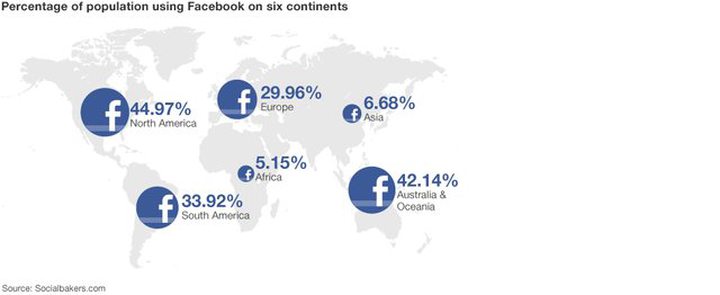Facebook Surpasses One Billion Users As It Tempts New Markets

The company said that those billion users were to date responsible for 1.13 trillion “likes”, 219 billion photos and 17 billion location check-ins.
The site, which was launched in 2004, is now looking towards emerging markets to build its user base further.
“If you’re reading this: thank you for giving me and my little team the honor of serving you,” Mr Zuckerberg wrote in a status update.
“Helping a billion people connect is amazing, humbling and by far the thing I am most proud of in my life.”
Statistics released to coincide with the announcement revealed there were now 600 million users accessing the site via a mobile device – up 48 million from 552 million in June this year.
Since its early beginnings at Harvard University, Facebook users have befriended each other 140.3 billion times.
Sustained growth is seen as crucial if Facebook is to maintain its value – the company has seen its share price drop to about $22 (£17) from a starting price of $38.
Investors will expect the company to look at ways to make more from the users it already has as well as seeking to attract new users in areas of the world where it does not yet dominate.
“For Facebook the main challenge is not just to grow in terms of numbers, but more importantly to deepen and enrich engagements,” said Eden Zoller, principal analyst at tech research firm Ovum.
TV chat show?Although the service is by far the world’s biggest social network, there are key areas, such as China and Russia, where local competitors still remain the online networking tool of choice.
Last month, Mr Zuckerberg visited Moscow, where he made his first TV chat show appearance, as well as a highly publicised meeting with the Prime Minister, Dmitry Medvedev.
It was a public-relations exercise designed to unsettle VKontakte – a network that boasts in excess of 100 million members, compared with Facebook’s seven million, in the country.
In the same trip, Mr Zuckerberg made a “surprise” visit to one of the company’s arranged hack-a-thons to meet local developers.
Other trips include to China, where the company said it was busy “watching and learning” from other internet firms.
Google, which launched in China in 2005, faced fierce criticism when it agreed to allow censorship of search results. It later changed its stance, and now directs all of its traffic through its Hong Kong-based site.
Success for Facebook in China would mean unseating RenRen (more than 30 million users) and possibly the Twitter-like service Sina Weibo (more than 300 million users).
‘Every phone’?In Africa, Facebook has targeted the use of basic phones – known widely as “feature phones” – which are unable to display the full-featured site, but instead can use specially created variations of the network.
Specifically, a project called Facebook for Every Phone, which was launched following the company’s acquisition of feature-phone specialists Snaptu, is central to its growth strategy in the region.
“Facebook is doing very well in Africa,” said Erik Hersman, a Kenyan-based blogger.
“You even see people using it in the rural areas – often people will ask for a phone with Facebook on it, not caring/knowing about the internet at all.”
There are considerable monetisation opportunities too. The continent has, at a pace far outstripping the west, adopted mobile payment systems in huge numbers – more than 15 million in Kenya alone.
In developed markets, one path to better engagement with users could be through new features that make use of Facebook’s vast quantities of personal data about each of its members.
In recent weeks, Facebook has been looking to monitor the real-world effects of advertising on the platform.
These efforts are key if the company is to convince businesses that investing in the platform is not a waste of money – recent admissions over “fake” users and have dented the site’s credibility.
It has enlisted the help of US market research firm Datalogix to try to produce evidence that seeing an advert on Facebook – without necessarily clicking on it – is enough of an engagement to get people buying products in shops.
Data ‘goldmine’?However, this vast data bank is tricky to utilise, according to Ovum’s Ms Zoller.
“There’s no doubt that Facebook is sitting on a potential goldmine of customer data,” she said.
“But that goldmine can also be a minefield. We know that Facebook, despite its claims to the contrary, constantly pushes the boundaries of what’s seen as acceptable in regards to data privacy.”
Much of Facebook’s advertising model features around “likes” – however their worth is disputed?This goldmine could swell further. In the UK, ministers are said to be considering using Facebook, among other services, to act as official identification for accessing public services online.
Such advancements are being noted by data regulators. In Europe in particular, Facebook has been faced with increased demands to tighten data privacy practices.
The company, which has based its European headquarters in Ireland, was last month told by the Irish Data Protection Commissioner, Billy Hawkes, that it must amend its Phototag feature – a tool powered by facial recognition software.
Following an extensive audit, the commission also sought extra assurances from Facebook over issues surrounding account deletion and targeted advertising.
As it continues to innovate and evolve, the company would need to get used to finding itself audited and investigated, said Ms Zoller.
“They’re so high-profile,” she said.
“They’re a bit of a poster boy, but they could be a whipping boy if they’re not careful.”





